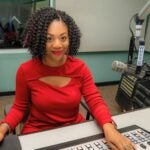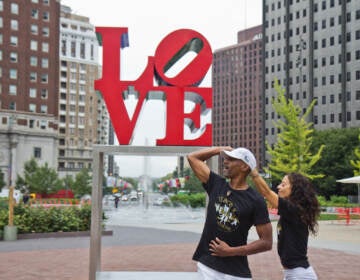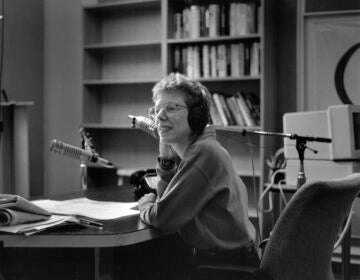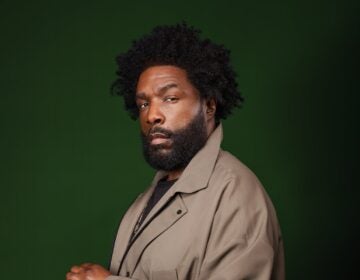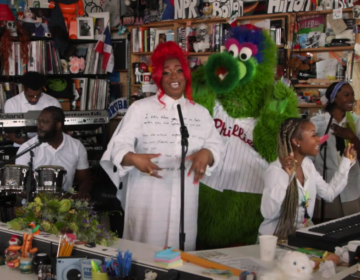NPR’s popular race and identity podcast joins WHYY’s Saturday morning line-up
NPR Code Switch joins WHYY’s Saturday morning lineup. Founding co-host Gene Demby, a Philadelphia native, discusses the milestone of launching in his hometown.
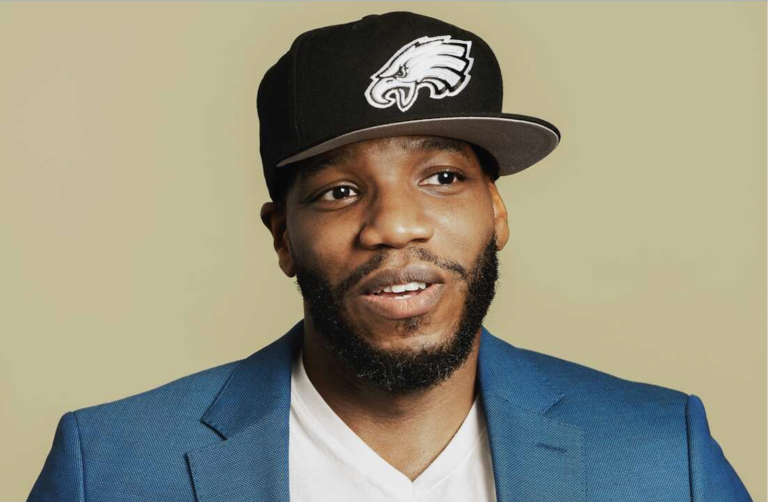
Gene Demby (NPR)
Code Switch, NPR’s award-winning podcast that tackles complex issues related to race, ethnicity, and identity, is joining the WHYY Saturday morning line-up. The show will be paired with Life Kit, another popular NPR podcast, for an hour of radio listening at 11 a.m.
South Philadelphia native Gene Demby, along with Shereen Marisol Meraji, are the founding co-hosts of Code Switch. Demby originally served as the team’s lead blogger, where he won the 2014 Online News Association Awards for Commentary. In 2021, Code Switch was named Apple’s first Podcast of The Year.
Demby joined WHYY afternoon host, Cherri Gregg for a one-on-one interview to discuss the launch of Code Switch on WHYY-FM Saturdays.
—
Gene, welcome home!
Mama, we made it!
It’s really dope. Cause you were from South Philly and now the podcast-turned-syndicated show, that you co-founded, is coming to your hometown. How do you feel about that?
This is honestly the dopest thing that’s ever happened to me professionally. Maybe now my family might know what I actually do. You know what I mean? And also like Philly plays a big part in how I understand the world, even to this day.
So how do you view Code Switch and what it’s meant to do?
Obviously, the sort of formal pitch is: Code Switch is a show about race and identity from NPR. And we tackle all of these big issues about how we identify… but race is this really messy concept, right? I mean, it’s about self-identity, but it’s also about the way we organize and stratify society, right? It’s about who we find community with, it’s about how we allocate our tax dollars, right? Like all these issues are issues of race. So, it’s been just a really challenging and like provocative subject matter areas to cover. And obviously, I mean the last year has been… with everyone, turning their attention to these issues of race, turning that attention to us, to really to sort of guide them through this, we felt a lot of responsibility in being sort of good shepherds, but also good co-travelers, right? And trying to understand all the stuff that we talk about when we talk about race.
You’ve been talking about this topic of race since the early 2000s. You started out blogging. How did Code Switch become Code Switch?
Like you said, we were a blog. I was the main, the lead blogger and Shereen was reporting for NPR, for our news shows, like All Things Considered and Morning Edition, but we didn’t have a podcast, cause nobody in like 2013, when we launched… there were some podcasts, NPR, but not a ton.
And so one time we were just all in the office and Karen — Karen Grigsby is on our team — mentioned that there was the whitest, historically Black college in the United States in West Virginia. And we were like, “What are you talking about?” And it turns out that this school called Bluefield State University: 98% white, but it’s an HBCU. And Karen was like, “Wouldn’t it be wild if you went there for homecoming?” And we were like, “Absolutely, we should go down there for homecoming to see what’s good.” And so we went down to homecoming at the whitest, Historically Black College/University.
When we found this bananas story that could not fit in a seven-minute radio piece, we needed to tell this long story about how this Black college became a white college and it involved bombings and it involved, all this sort of like class conflict between like… we’re at the homecoming, it was like 65-year old, like middle-class/upper middle-class Deltas looking sideways at these poor white folks who went to the school, who were like the current undergraduates. It was this bananas story. And we were like, “how do we tell this?” And Shereen was like, “maybe we should pilot an episode of a podcast. And that was like the first seed of it. And one day we will find this tape. We will try to figure out what happened and put it together.
How has the conversation, in your mind, evolved to today where this is a topic that I think a lot of white people never talked about, but now it’s, it’s a subject that people are [talking about] at dinner tables all over the country?
The wild thing is, there’ve always been, obviously, plenty of people of color talking about this stuff, right? But one of the things that’s been fascinating just, in the last — we’ve been doing Code Switch as a team for a little over eight years, but as a podcast for five years — we talk about it a lot. Like we’re learning together with our audience, with our readers before, and now with our listeners. And a lot of this stuff, it’s just becoming more and more complicated all the time.
So just generally in the media, there was a lot of interest in issues of race in America with a very specific lens during the Obama administration, right? “Why haven’t we overcome?” … Michael Brown happens, Trayvon Martin happens. Then you see the Trump administration follows that immediately. And you start to see, like, there are obviously structural forces in the world that create disparities and all this stuff, right? We’re all becoming much more well-versed in how pervasive this inequity is, and how individual sort of excellence is not a balm for it.
I got to tie it back to Philly because when we started this conversation, you said that Philadelphia kind of laid the foundation on how you see the world. How did it do that?
So many ways. So I’m from South Philly, but I went to a magnet school. I went to Carver High School of Engineering and Science. And it wasn’t until I was in college that I realized that the magnet schools in Philadelphia and a lot of big cities, especially in the Northeast, were created as a response to white flight. I grew up after the Rizzo years, right? But like I grew up in a city where my mom was telling me about the Philadelphia police department and what they did to Black folks. Right. I learned a little about the MOVE bombing, and I got to explore that a little bit more, but all those things are things that deeply shaped the way that I think I report to this day,
Given the breadth of the discussion that race has kind of expanded to, how do you still stay focused?
I mean, it’s really hard. Like literally every day we could do a different story, right? Like if you just want to do, like, this is a story about racial conflict, right? This is a story about racial injustice. A lot of times we have to step back and sort of say, “how do we tell a story in a way that we’re learning something? So we all come out of this with a different frame of reference or at least a different way of looking at these problems that we all live with?” It’s a fun problem to try to solve. You know what I mean?
I have to ask you: your founding co-host Shereen Meraji. I love her by the way, but she’s leaving the show. So how’s that going to work?
Obviously, Shereen is like a very singular reporter. You know what I mean? And so much of what we have done, it’s our voice. It’s like she and I are sort of like trying to figure stuff out together on the radio. I’m gonna miss her so much, but … we don’t know what’s going to happen. Like we are trying, you know, we’ve got to try to find replace Shereen, but how do you replace Shereen? But I think so much of the DNA, so much of the stuff that we will be doing is because of her, right? Like putting yourself in the story, right? Not being afraid to be vulnerable. Like that’s part of the DNA code switch because it’s Shereen, and whoever comes along next, it’s going to have that too, because she sorta laid this template for us. So she’s still gonna be with us anyways.
You guys are going to be playing some of the podcast. There’s a lot of material here to put on air. As people try to dip their toe into five years of material, are there some favorite episodes you recommend people check out?
There are so many. We just celebrated our 300th episode! Like literally there’s so many.
Shereen has done a lot of really fantastic reporting on Latino identity. She went to this town Holyoke, which is in a place you wouldn’t expect: New England. And it has a giant Puerto Rican population. And it was about sort of this diaspora that came after the hurricane. Suddenly there were more Puerto Ricans in Florida and places like New England. And what that meant for Puerto Rico and Puerto Rican identity.
One of my favorite episodes was about Calvin from the McDonald’s commercials, and what he might teach us. You remember Calvin? We wanted to interrogate, like, what does it mean to support Black businesses and how have Black businesses sort of leveraged that energy in the past?
There’s an episode that I love and with Shereen went to Hawaii to talk to some people who were trying to revive the Hawaiian language that has mostly gone away. And these are people who didn’t speak it themselves, like all of these sort of issues of identity and trying to figure out who we are and how we work in the world. Like, there’s just so many episodes that touch on these things. I really wish I’d had a cheat sheet.
So folks can just push play!
Yes, absolutely. Absolutely.
You can listen to Code Switch, along with NPR’s Life Kit every Saturday morning at 11 a.m. on WHYY 90.9 FM.

Get daily updates from WHYY News!
WHYY is your source for fact-based, in-depth journalism and information. As a nonprofit organization, we rely on financial support from readers like you. Please give today.


